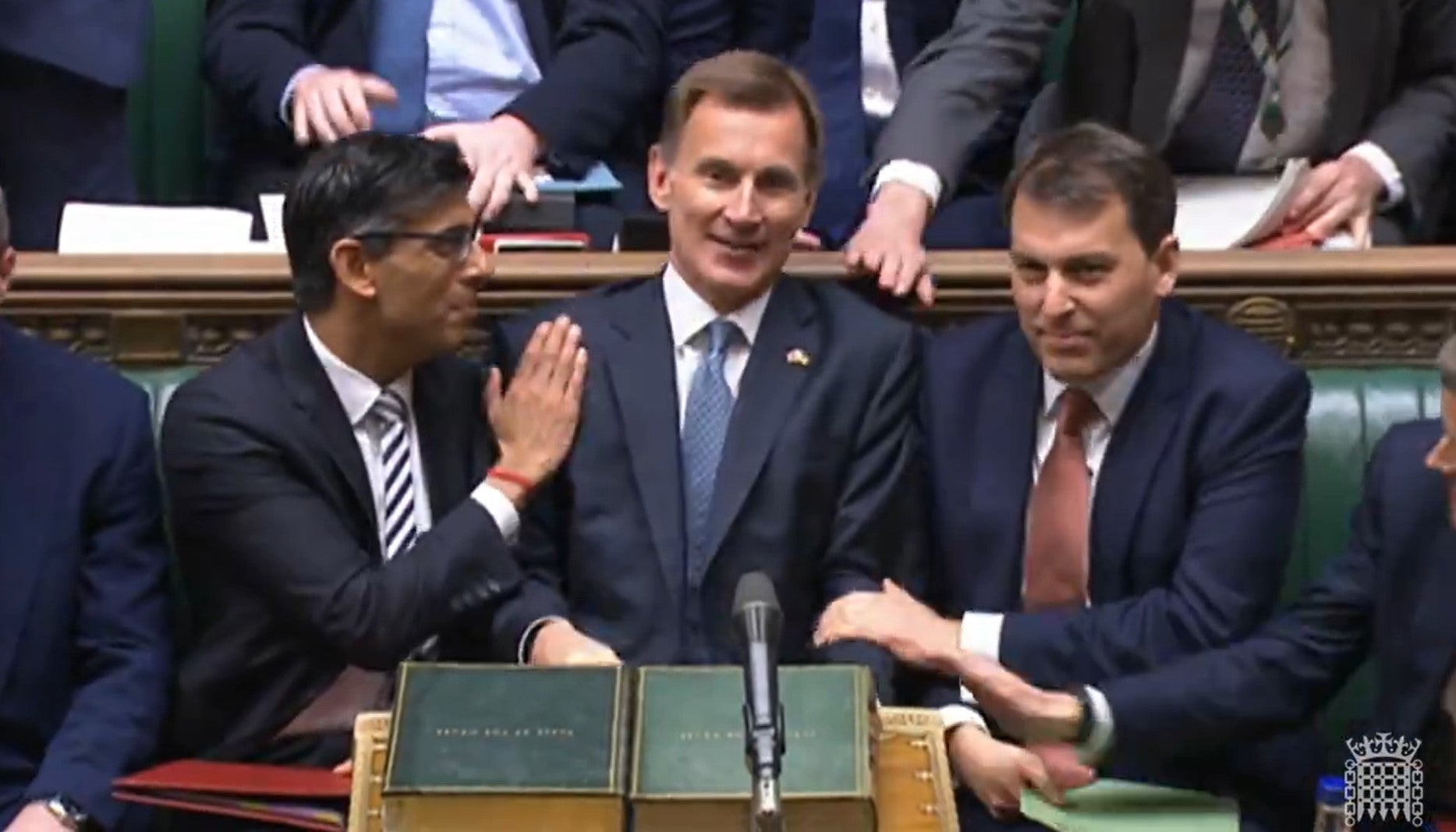How to win the big political arguments – the art of a well-timed briefing
‘Pitch rolling’ – or fully preparing the ground, including public opinion, for an important policy announcement – has become a key part of the Tory government playbook, writes Andrew Grice. But it doesn’t always go as planned


When Jeremy Hunt delivered his autumn statement in November, there were remarkably few surprises, in a break with the usual practice of the chancellor pulling a “rabbit” out of his Budget hat.
The other Budget tradition – secrecy ahead of the event – has long since died. In 1947, the chancellor, Hugh Dalton, resigned for tipping off a journalist about one of his measures minutes before he announced them. Today the Treasury pumps out press releases in the week before a fiscal event to spread the jam more thinly and secure more positive headlines.
Hunt appeared to take this process to new lengths by pre-briefing £55bn of tax rises and spending cuts in an unusual level of detail. It was an example of what politicians call “pitch rolling” – preparing political, media and public opinion for a big policy announcement so it “lands well,” in the spin doctors’ language.
The phrase was coined by former prime minister David Cameron, a cricket lover who worked in public relations before entering politics. As Craig Oliver, his director of communications in Downing Street, explains to me: “You can’t play on a cricket pitch unless the ground has been properly prepared; the ball goes in all sorts of directions. David’s view is that it’s the same in terms of communications. You want to socialise the argument before you are fully committed to it. You get people used to the idea that there is an issue here, something must be done and say ‘this is an obvious solution to it.’ It’s a good metaphor. It’s a fresh way of articulating an argument that has been around successful campaigns for a long time.”
Privately, some senior Labour figures admit Hunt did a good job in preparing the ground for his unpalatable measures. But one says: “It wasn’t really a new way of doing things. Gordon Brown put as much effort into briefing his Budgets as into the content.” Hunt probably had little alternative: his approach was shaped by the need to avoid a repeat of the financial markets’ hostile reaction to Kwasi Kwarteng’s mini-Budget eight weeks earlier. As Oliver says: “The pre-announcements were pitch rolling in a sense of there being no surprises. But you could argue that Jeremy Hunt was almost taking dictation from the bond markets.”
The contrast with Kwarteng’s disastrous fiscal statement could hardly have been greater. Although Truss had promised tax cuts when she defeated Rishi Sunak in the summer’s Tory leadership contest, she had not prepared the markets or the public for the detail – notably her decision to scrap the 45p top rate of income tax.
“The advice of friendly economists was ignored; ‘rolling the pitch’ was never done properly,” according to Harry Cole and James Heale in “Out of the Blue”, their racy, very readable Inside Story of the Unexpected Rise and Rapid Fall of Liz Truss. They judge that the help with energy bills she needed to announce was “clearly such an anathema to her that she wildly overcompensated” with huge unfunded tax cuts. Some ministers think Truss could have sold her controversial measures better. “Our policies are great but our comms is s**t,” Penny Mordaunt, the Commons leader, said during the Tory conference.
Truss kept her communications team out of the loop, according to Whitehall insiders, even though they could have prevented her mistakes; then they got the blame when things went wrong. Truss banned her civil service press secretary from attending cabinet meetings, prompting protests from Westminster journalists about a lack of transparency. Cabinet leaks kept coming, in a reminder of a line from TV’sYes Minister: “You leak. I brief.” Unusually, some spin doctors’ jobs went unfilled under Truss, with potential recruits apparently unwilling to join a ship that began to sink remarkably quickly.
Although Oliver does not believe pitch rolling would have saved the mini-Budget, he said it would have allowed Truss to “understand how people would react before it is too late. You would have a chance to influence the argument. What you are trying to do is to control the debate as much as possible.”
Boris Johnson, notoriously contemptuous of tradition, paid little heed to the rule that announcements should be made to parliament first
Boris Johnson, notoriously contemptuous of tradition, paid little heed to the rule that announcements should be made to parliament first. The ministerial code states: “When parliament is in session, the most important announcements of government policy should be made in the first instance, in parliament.” It brought Johnson’s government into repeated conflict with Lindsay Hoyle, the Commons speaker, who said it was “not acceptable” for ministers to brief the media first. Sunak was rebuked by the speaker for briefings ahead of his March 2021 Budget but that didn’t stop them happening before his second Budget that October. Hoyle said then: “[It] seems to me we’ve got ourselves in a position that if you have not got it out five days before, it’s not worth putting out.” He warned he would retaliate if the practice continued, by granting more urgent questions – which ministers are summoned to the Commons at short notice to answer – so government business would be blocked.
In practice, there is little the speaker can do to prevent pre-announcements, as Hunt’s autumn statement showed. Ministers hold the cards. The speaker can’t stop ministers or their advisers talking to the media. Not all stories are handed “on a plate” to journalists, whose job is to find out what is going on. Ministers’ adherence to the code’s rule on announcements is highly flexible: they ignore it when they wish but cite it when it suits them. In a recent Sunday media round, Mark Harper, the transport secretary, declined to answer questions about the forthcoming Online Harms Bill, saying parliament should be told first, even though Michelle Donelan, the culture secretary, had already issued quotes about the measure to the Sunday newspapers.
Good pitch rolling can reap big political rewards. Cameron and George Osborne articulated the case for austerity measures to bring down the deficit before winning power in 2010. It set the terms of political debate, made the coalition government’s cuts easier to sell to the public and threw Labour on to the defensive. When the Labour leader Ed Miliband, speaking without notes at his party’s 2014 conference, unintentionally omitted a section on the deficit, he was criticised for ignoring the most important issue of the time.
However, Cameron didn’t always stick to his pitch-rolling mantra. He abandoned plans to privatise the 640,000 acres of Forestry Commission land after failing to prepare the ground. He paused controversial plans to restructure the NHS drawn up by Andrew Lansley, his health secretary, before relaunching them. As Oliver recalls, this was “what can happen if you don’t roll the pitch properly.”

Critics say Cameron also ignored his maxim over his ill-fated decision to call the EU referendum which ended his premiership. Peter Wilding, a Remain campaigner alongside Cameron, told him: “You have to roll the pitch before you hold the referendum” and that he should spend at least two years saying Britain should be “leading not leaving” the EU. But, Wilding recalled, Cameron had won the 2014 plebiscite on Scottish independence “on fear” and adopted the same tactic, dubbed “Project Fear”, for his EU campaign. An over-confident Cameron called the referendum in 2016, even though he could have delayed it until the following year.
Theresa May also paid a heavy price for failing to roll the pitch when she rushed out plans to reform social care in the Tories’ 2017 election manifesto without consulting her cabinet. She was forced into a U-turn on what was dubbed a “dementia tax.” The controversy destabilised the Tory campaign and Jeremy Corbyn denied May an overall majority.
May’s approach to government was to “do less and do it better,” according to her allies. She did not want to copy the government-by-headline introduced by Tony Blair and copied by Cameron. Truss also made such noises and now Sunak’s team sends similar signals. One ally says: “Rishi is not going to be all over the airwaves. Unlike Boris, he will show he is managing a team. He will make strategic interventions when he has something important to say.”
In line with this thinking, Downing Street decided that ministers will appear on the morning TV and radio programmes on three rather than five days a week. This raised media eyebrows, with broadcasters suggesting it was at odds with Sunak’s pledge to govern with “integrity, professionalism and accountability.” Aides say it is not in the government’s interests to provide a “running commentary;” daily appearances can sometimes fuel unwelcome stories. In practice, most prime ministers become embroiled in day-to-day firefighting – whether over party management or external events beyond their control.
Despite the successful pitch rolling ahead of the autumn statement, Sunak has not yet repeated it on policy issues as he has not set out his agenda. There was a marked absence of preparation before plans were floated for a closer Swiss-style relationship with the EU to improve Johnson’s thin trade deal.
Although Sunak allies want to reduce trade friction, hardline Brexiteers reacted with predictable fury, blaming the reports on Hunt, a 2016 Remainer. Sunak beat a hasty retreat. “It was probably more cock-up than conspiracy,” says one former minister. “But it showed the need to think things through before shooting from the lip.”
If Brexit is off-limits for now, what will be the next pitch to be rolled? Oliver thinks it might be reform of the overstretched NHS to give it a sustainable future. He says: “Two years ago at the height of Covid-19, the idea of some kind of change would have been impossible to imagine. You would have just been shouted down. Now, slowly but surely, you can start to see people trying to roll the pitch for a debate about an NHS that will work in the future.” As his old boss Cameron discovered, our politicians will be treading on eggshells. “It’s not about losing or privatising our NHS,” Oliver insisted. “It will be a very long process.”




Join our commenting forum
Join thought-provoking conversations, follow other Independent readers and see their replies
Comments